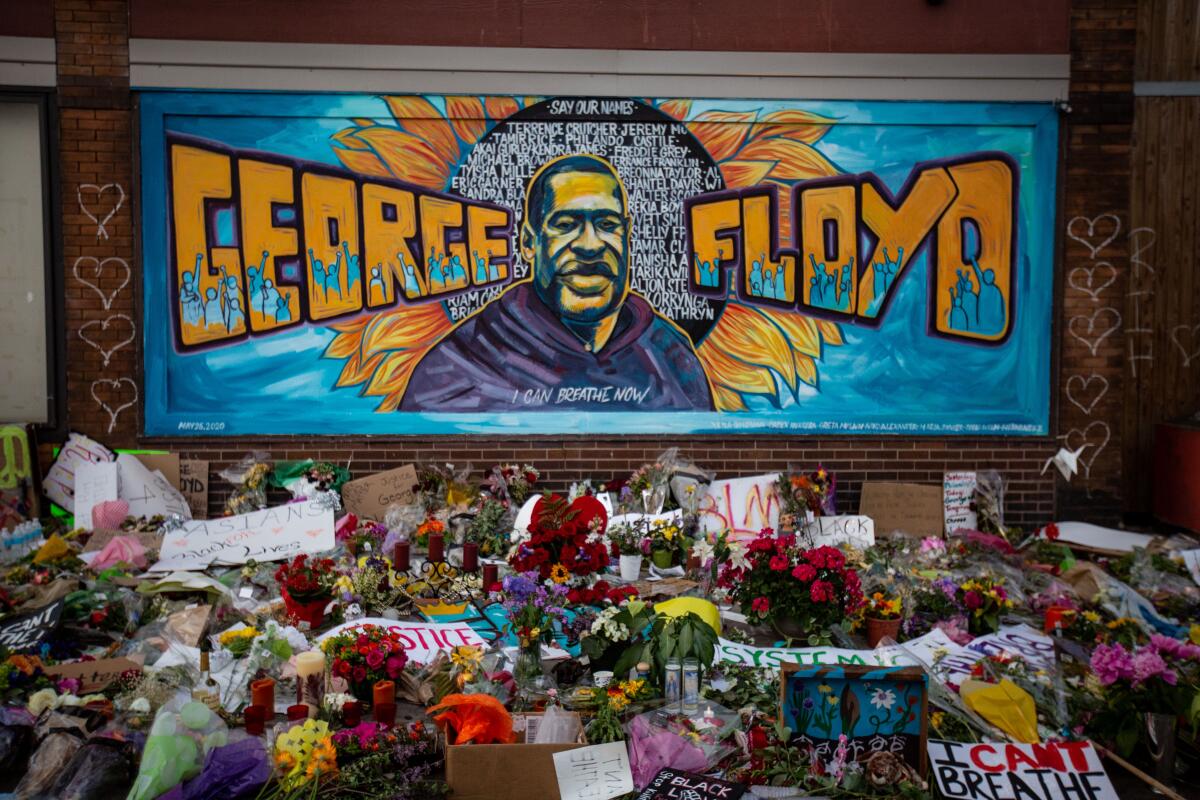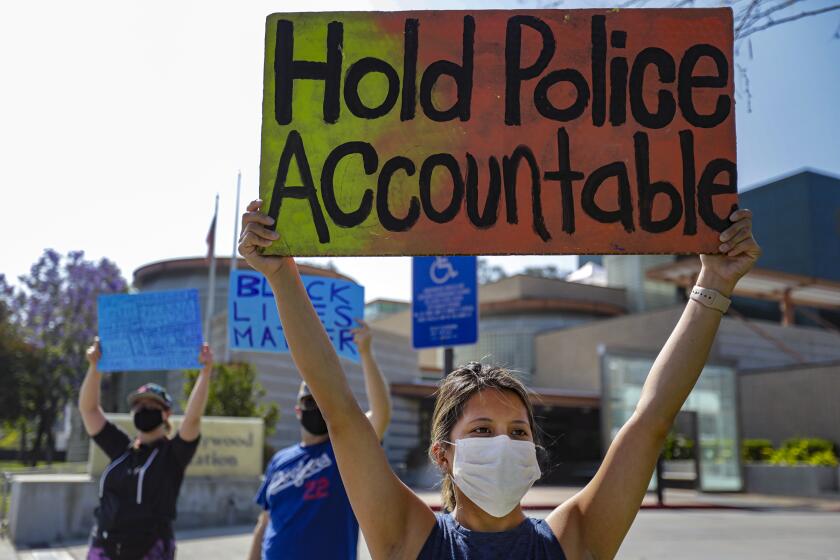California passes some modest police oversight bills, but other measures fall short

- Share via
SACRAMENTO — After weeks of protests against law enforcement treatment of Black people, California legislators on Monday were largely unable to pass a suite of police reform measures, as the session ended chaotically.
Plagued by technology glitches, frustration and outright anger at times, lawmakers passed a proposal to have the state attorney general or another state prosecutor look into fatal shootings by peace officers.
That measure, AB 1506, authored by Assemblyman Kevin McCarty (D-Sacramento), passed with bipartisan support. Similar measures by McCarty have been squashed twice before, in part because state attorneys general, including Xavier Becerra and Kamala Harris, have opposed having their office oversee police shootings, arguing they lacked the fiscal resources and already had the ability to step in if local investigations were inadequate.
The version of the law that was sent to the governor leaves the door open for creating an entirely new state-level office to investigate police shootings, rather than the attorney general’s office, which could provide a workaround if the Department of Justice remains reluctant to take on the job. The bill also does not go into effect unless the Legislature approves funding for associated costs.
“Let’s face it, the attorney general hasn’t really expressed an interest in doing this, which is really unfortunate,” McCarty said. “So there are other models out there.”
McCarty was also able to secure passage of Assembly Bill 1185, which clarifies how county boards of supervisors can create oversight commissions for sheriffs. The bill also gives subpoena power to those boards.
McCarty has been working to pass that measure since, in 2017, Sacramento County sheriff’s deputies shot and killed Mikel McIntyre, a Black man who hit an officer and a K-9 dog with rocks while experiencing a mental health crisis.
The Sacramento County inspector general found the shooting to involve excessive force, with one officer firing 18 rounds across a freeway, hitting McIntyre in the back as he fled. Sacramento County Sheriff Scott Jones locked the inspector general out of the sheriff’s department after the report was made public and demanded his ouster.
Oversight has also been an issue with the Los Angeles Sheriff’s Department, another example cited by McCarty.
“Unfortunately, we have sheriffs across California who say, ‘My oversight is the election and if you want a conversation on oversight you can have it every four years,’” McCarty said. “This is needed throughout California.”
Legislators also banned the use of some neck restraints including chokeholds. AB 1196 was passed with bipartisan support, and earlier this year, Gov. Gavin Newsom encouraged law enforcement agencies statewide to stop training for such tactics. Most large departments already restrict or ban dangerous carotid restraints, but the new law brings uniformity to state standards.
Despite a handful of minor victories for policing reform, the most far-reaching and controversial measures remained without a vote by the midnight cutoff. Among those, the most contested was a measure stripping troubled officers of their ability to keep a badge and holding officers to some financial responsibility if sued.
Law enforcement groups opposed that bill, Senate Bill 731, authored by state Sen. Steven Bradford (D-Gardena), arguing it went too far in including a powerful citizens commission to evaluate officers’ actions, and also might conflict with existing labor laws. Bradford has long contended that distrust of internal police investigations made citizen oversight a necessity, and pointed out that California is one of only five states that doesn’t have a centralized method for decertifying peace officers who engage in serious misconduct.
The bill was written in response to the killing of Kenneth Ross Jr. by a Gardena police officer in 2018, at a park near where Bradford grew up and still lives. Though Los Angeles County Dist. Atty. Jackie Lacey deemed the shooting justified, Ross’ family has filed a civil suit and contends the officer who fired his weapon had been involved in multiple shootings while working for another police agency.
Currently, it is difficult to trace an officer’s history of use of force if they switch jobs, which critics contend allows problem officers to move from agency to agency.
A second bill meant to fix that inability to track bad officers also failed Monday after coming close to passing.
SB 776 by state Sen. Nancy Skinner (D- Berkeley) would have built on an open-records reform from last session that requires the release of personnel records following certain serious incidents, including lethal use of force and sexual misconduct by officers.
The new measure would have expanded access to records to include those pertaining to any sustained instance of use of force by an officer, or any instance where an officer is found to have lied. Though the measure was amended in the last days to soften some provisions, it would have marked a significant expansion of what information departments must release to the public — though many agencies across the state have been slow to release those records already required by law.
The bill passed both houses, but time ran out before it could return to the Senate for a concurrence vote that likely would have been successful.
A measure creating strict rules about when and how law enforcement could use non-lethal projectiles, such as rubber bullets, and tear gas to disperse crowds also stalled. In Los Angeles and across California, protesters have clashed with police in recent months, leading to multiple reports of serious injuries from such weapons.
Among the failed measures was a law that would have required fellow officers to intervene when they witness excessive force.
With the myriad of proposed reforms, some police unions last week requested the Legislature call a special session on police reforms before moving any of the proposals, but that idea was quickly dismissed by the governor.
Instead, police unions and reform advocates lobbied furiously as the deadline for compromise hit Friday, with law enforcement finding some legislators sympathetic to the notion that a session condensed by the pandemic and plagued by wildfires was too rushed for careful reforms.
Measures that died earlier in the session included one that would have mandated officers intervene if a fellow officer used excessive force. Bills passed Monday will now head to the governor’s office, where he has until Sept. 30 to sign them, veto them, or allow them to become law without his signature.
More to Read
Sign up for Essential California
The most important California stories and recommendations in your inbox every morning.
You may occasionally receive promotional content from the Los Angeles Times.















